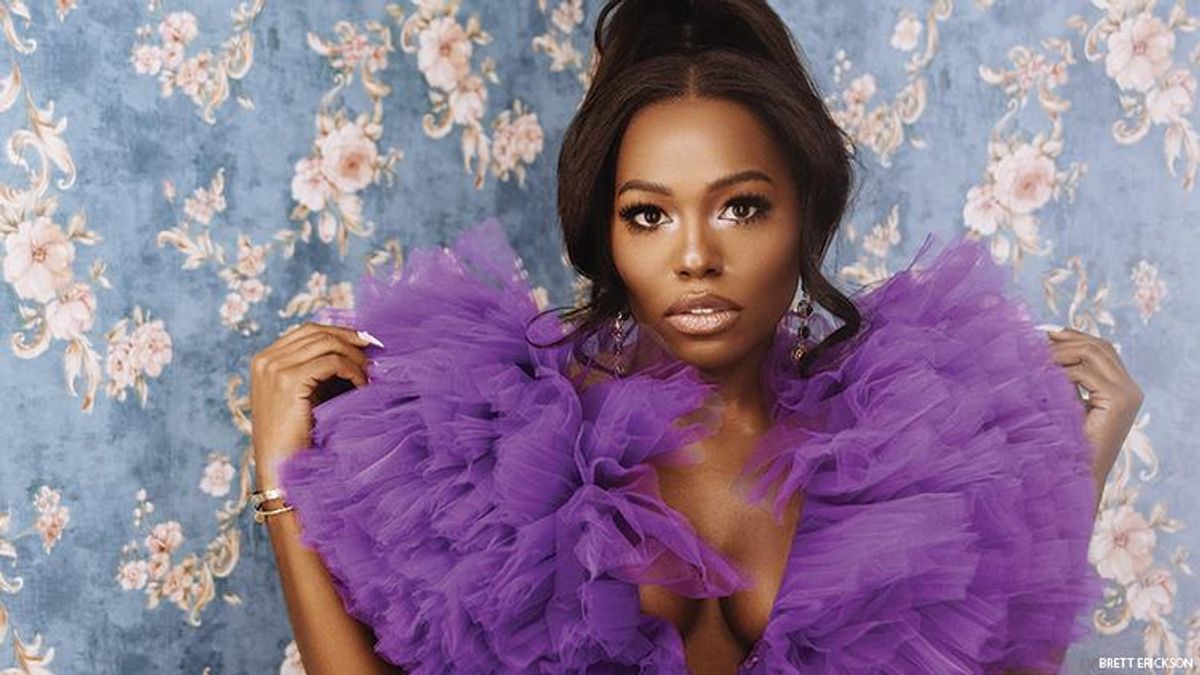There's a scene in the iCarly reboot's first season on Paramount+ where Laci Mosley's bisexual character, Harper, and her crush, Poppy Liu's Double Dutch, kiss. It's a moment that LGBTQ+ folks and people of color who were fans of the original 2007 Nickelodeon show about a girl who becomes internet famous in the early days of web videos could only have imagined. The scene features two queer actors, one who is Black and one who is Asian, playing queer characters and acting on their attraction. For Mosley, who's known for A Black Lady Sketch Show on HBO and for her podcast, Scam Goddess, about -- you guessed it -- famous grifters, iCarly's inclusion of various kinds of people offers a space where marginalized folks can see themselves free of trauma and stereotypes.
As a kid, Mosley watched the original iCarly, which starred Miranda Cosgrove in the lead role, as does the reboot, which brings back several of the show's original stars.
"It was a nice little kind of escapist weird cool world where there were no parents and no one to make you live a responsible life, which was fun because that's certainly not what I was ever tasked to be," Mosley says.
"What's cool about it being a sealed, hermetic world...is that by infusing that world [in the reboot] with real people who exist who are not really depicted in the original -- queer people, more people of color...people in the disabled community...it makes the world more rich and full."
"It also gives people this perspective that I don't think you see a lot in television when you see diverse stories, which is usually [that] they're surrounded by the trauma and the pain," Mosley adds. iCarly's characters "get to exist in this wacky world where people aren't catching fire and weird stuff is happening all the time. They're not a problem. They're not something to be dissected. They're not something to be othered. They're just a part of it, which is amazing for kids to grow up and see."
/Although the iCarly world on-screen is aspirational and idyllic, Mosley, whose character is Carly's best friend, faced racist backlash from an online contingent angry that Jeanette McCurdy, who played best friend Sam in the original series, would not return for the reboot. While the ability to block certain words on social media helped Mosley avoid seeing racist posts where she's tagged, she believes the ire has calmed down. She adds that iCarly's real fans are not "bigots" or "hateful."
"With any fandom, there's a personal attachment to the show that the fans have, and I think we're one of the few fan universes that really cares about the fans and wants to make them happy," she adds.
"I feel like it happens every other two days where there's some animated show or sci-fi show or something that's coming out...Doctor Who, where it's like, 'Oh, well, they're putting a Black person here. That's not what we imagined in this fake world.'"
"This man time travels," she says, pointing out the already unreal nature of Doctor Who.
For everyone online who pushed back at Mosley's casting as Carly's best friend, there are so many Black and queer young people grateful for her portrayal.

"I get emotional sometimes when I see people or young people tweeting me [about visibility]. When I was at the Kids' Choice Awards, I gave a shout-out to all the sapphic queens. People were tweeting me, spamming me, and they're like, 'Oh, my God, we can't believe you said this on Nickelodeon. Oh, my God!'"
"There's such a beauty in people feeling seen and hopefully, in turn, making people who perhaps have always been seen not feel so afraid of new faces coming into this world. I grew up basically watching only white folks on television. I still found a way to see myself even if they were straight [and white]," she says.
"Everyone else can do that as well instead of seeing it as an affront to your norm and to you not being the center of every narrative. You can see it as a window into worlds that you probably would never even know or understand."
This story is part ofThe Advocate's 2022 Advocacy and Politics issue, which is out on newsstands July 18. To get your own copy directly, support queer media and subscribe -- or download yours for Amazon, Kindle, Nook, or Apple News.














































































